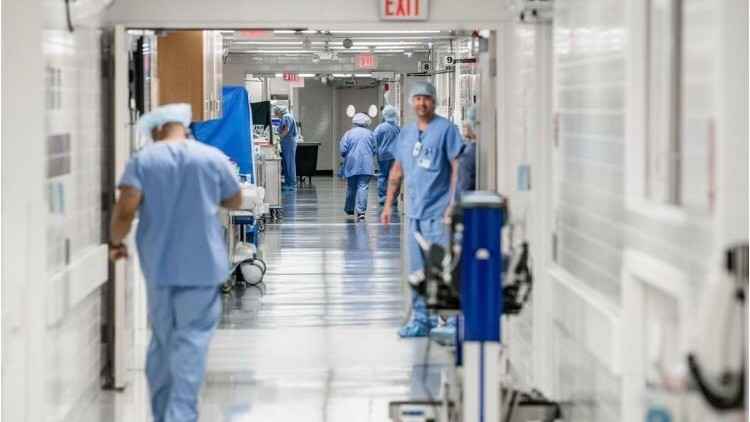New program at local hospital for those dealing with stress on the front lines
[anvplayer video=”5075381″ station=”998122″]
North Memorial Health Hospital is a place of healing.
“Any kind of patient,” declares Brandi Lesnar, a nurse manager for Ward 2, an observation unit. “Whatever their need is, we can take care of all those kind of patients, yep.”
But for health care workers there, it can also be a place of hurting.
"It’s scary, it’s stressful,” says Jill Walker-Markie, a trauma nurse with thirty-two years of medical care experience. “It’s challenging work on its own, especially being on the trauma floor."
"Long before COVID came, burnout, moral distress, moral injury. These were things that were already here in the health care profession,” explains Kerry Appleton, the hospital’s resiliency coach. “COVID added more stressors, but it also acted as an accelerant.”

[North Memorial Health Hospital]
More patients.
Fewer beds.
Staffing shortages.
A supply chain slowdown.
All adding up to a perfect storm of pandemic stress.
We asked Lesnar what it’s like being at work right now.
“We are in a tough time,” she says.
Lesnar’s unit cares for up to forty patients — as many as 10 at a time — battling COVID.
"[We have a] staffing crisis. We have an overload of patients that come in, and with different things that are going on with them, they’re a lot sicker than our average patients,” she notes. "We have increased stress for our team members and so it’s really trying to just manage our team, and making sure they have what they need for the day."
So what to do?
“I come on-site and provide them with a burst of resilience,” Appleton says. “I was hired to create a resiliency program here for team members specifically.”
Appleton, a medical contractor with 20 years of nursing experience, started work in June.
She says she’s counseled with more than 1,600 people since July 1st.
"You may think that health care providers know what to be looking for,” Appleton says. “But it turns out we are highly trained in knowing what to look for with our patients, but we don’t have as much education and awareness around what to look for in ourselves. We make sure they understand what stress looks like on them because we all wear it differently.”
Self-awareness is among the first lessons she teaches.
“A lot of health care providers don’t feel seen. They don’t feel heard. They feel alone and they’re suffering,” Appleton says. “Unfortunately, the culture has kind of perpetuated this idea of just kind of ‘suck it up and keep going.’ And it’s not okay to not be okay, and you couldn’t be any more wrong.”
She says she does one-on-one and group counseling, encouraging staffers to speak up.
Lesnar says members of her unit have been taking part in the resiliency program for about six months now.
"So we’ve started to do some huddles and talk about mental health. Talk about what we’re appreciative of because sometimes we always focus on the negative or the hard parts,” she says. “I think it offers an opportunity for someone outside to listen. Maybe just to let someone speak and know they’re going to be listened to, and they’re going to be heard.”
Appleton also teaches about focused breathing and deep cleansing breaths.
"When you slow your breathing down, you slow your heart rate down, at the very same time,” she notes. “Generally, when people first start to experience stress, one of the first things that happens is our heart rate goes up."
Walker-Markie has been in the resiliency program for a few months now.
She says she’s learning to be more conscious about her own well-being.
"Do you need to just go run, walk, massage? she says. "Take some deep breaths and do that counting, eight in and eight out. And just help your body relax and a meditation thing."
Appleton says she also teaches a breathing meditation exercise called "heart math." She says it’s a way to consciously calm down heightened emotions.
“It is a way to regulate your emotions on the go,” Appleton explains. “So you don’t have to be in a quiet space. But these are techniques you can utilize in a room full of people, when the stress is really high, to help get your emotions headed in check, so you can keep going with the work you need to do."
But do these techniques really work?
Lesnar says yes.
“It starts our shift off focusing on our heart and deep breathing,” she declares. “If we enter in a calm state, it hopefully just sets our shift up for success, being calm."
These staffers say the workload isn’t getting any lighter.
A spokesperson for North Memorial Health says the hospital is “staffed at the same safe levels. We are using agency/temporary staff as needed to support the persistently high volumes we’ve experienced during the latest COVID surge.”
She also says the hospital is running at full capacity, including the intensive care unit and medical/surgical units.
The hospital says about 25% of their patients are fighting COVID-19.
Meanwhile, Appleton says she tries to emphasize to medical staff that they should leave work at work — that while some may not be physically at the hospital, their minds are still there.
She says that time off is important to recharge — and important to the patients, too.
"When people aren’t in a great space, when they’re angry, when they’re frustrated, when they’re sad, it’s hard to be the best nurse, the best doctor, the best respiratory therapist,” Appleton says. "Our goal is to give people tools and techniques to be able to pivot out of those places, and get to a better space.”